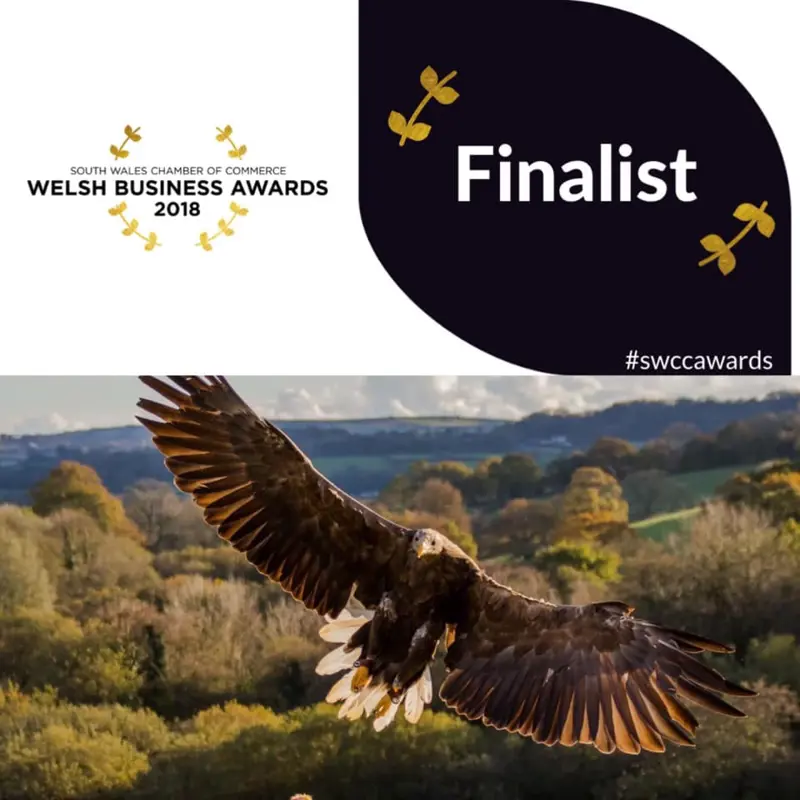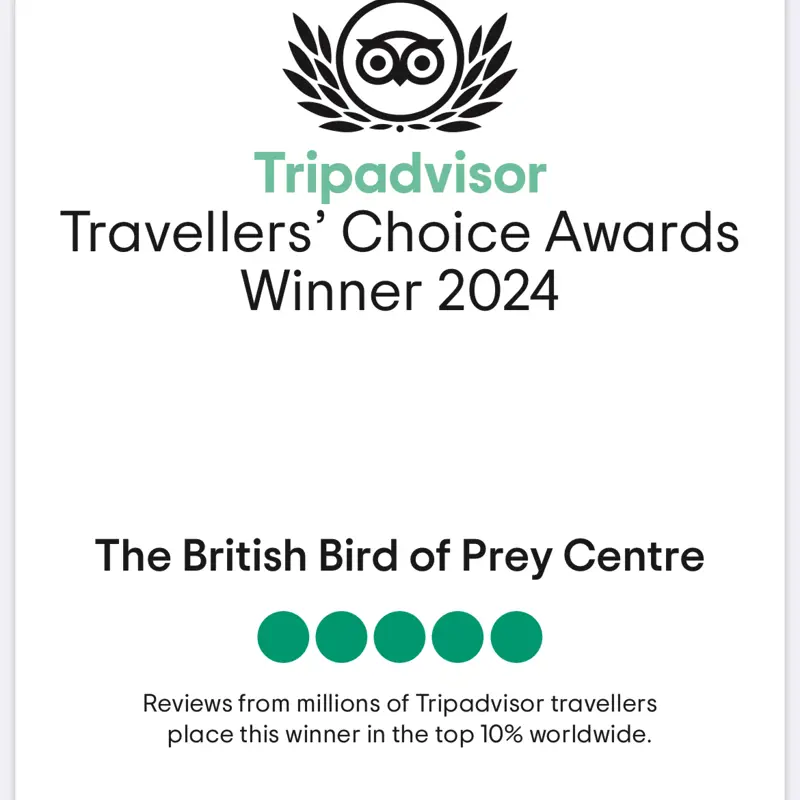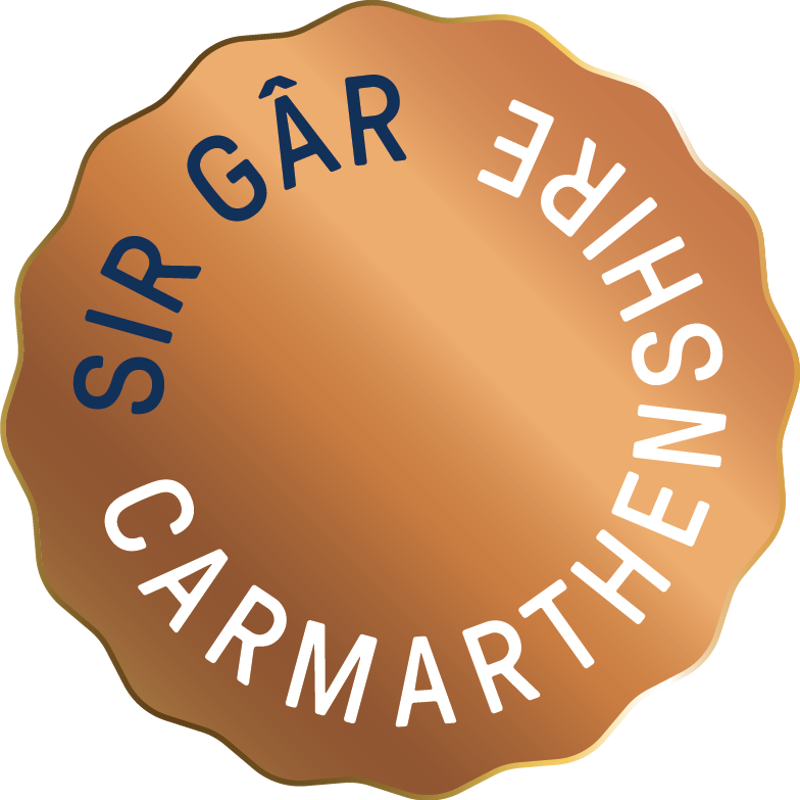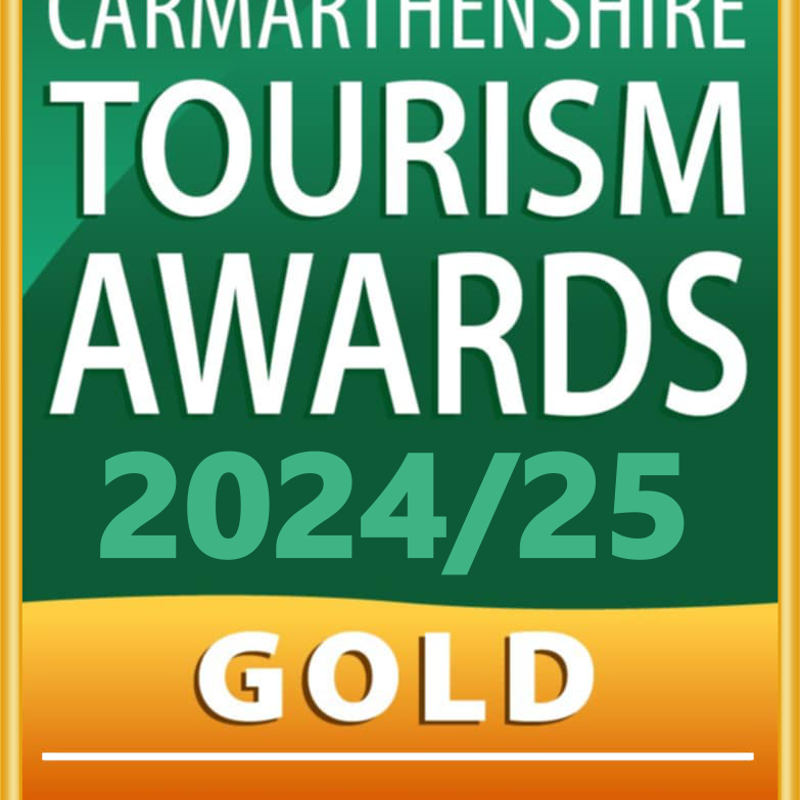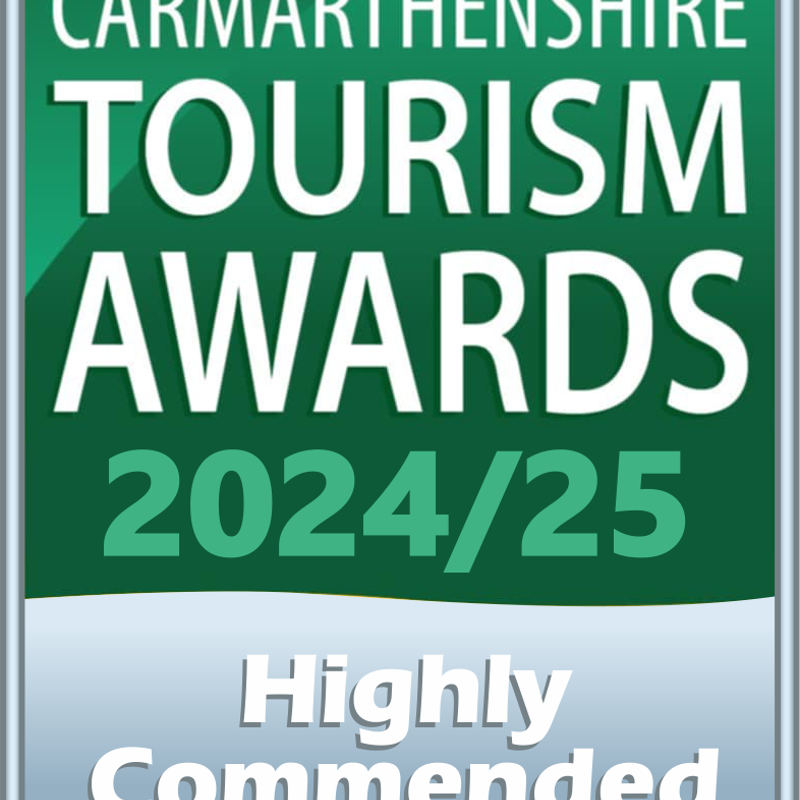NEW Centre Opening 18th October 2025 - Tickets available now
Flight
In addition to learning how a variety of birds of prey use their different styles of flight to gain an advantage over their prey, a visit to the Centre can provide the inspiration for a wide range of learning opportunities across the curriculum.
Science and Technology

A visit to the Centre can teach pupils about the ecosystems around them and enable them to identify and engage with scientific and technological change. It also encourages them to take risks, to innovate and evaluate, and learn to develop solutions.
During a visit to the Centre, learners can:
- watch how a variety of birds of prey use their different styles of flight to gain an advantage over their prey.
- work out what styles of flight work best for which species and why.
- study wing shapes and styles and the advantages and disadvantages of each
- learn how the natural world has influenced the development of different technologies
- find out how external factors have affected different species e.g. the use of pesticides and its effect on the food chain
- learn about the interdependence of various species within the ecosystem
Examples of progression steps:
I can recognise that what I do, and the things I use, can have an impact on my environment and on living things.
I can explore relationships between living things, their habitats and their life cycles.
I can draw inspiration to design from historical, cultural and other sources.
I can describe how living things compete for specific resources and depend on each other for survival.
I can describe the interdependence of organisms in ecosystems and explain how this affects their chances of survival.
Humanities

Experiencing the wonder of the natural world can contribute to learners’ spiritual development and well-being, and can help to cultivate in them a sense of place and sense of belonging, as embodied in the Welsh word cynefin.
During a visit to the Centre, learners can:
- consider their feelings about the birds, developing the language of emotions (joy, anxiety, awe etc)
- begin to think of their role, both as individuals and as part of society in protecting the fauna around us
- debate the effect that different groups may have on their behaviours – e.g. would they be influenced to drop litter or damage habitats in certain circumstances? How could they manage the influences of others?
Examples of progression steps:
I can recognise that my decisions can impact on me and others, both now and in the future.
I can understand how and why my thoughts, feelings and actions change in response to different experiences.
I can make considered decisions, taking into account available information, including past experiences.
I have developed an understanding that my values, attitudes and identity are shaped by different groups and influences.
Health and Well-being
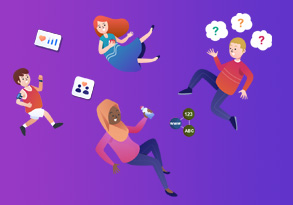
A visit to the centre can help learners to understand how decisions and actions impact on themselves, on others and on wider society, both now and in the future. It can also be a starting point for discussions about the benefits of outdoor activities and emotional well-being.
During a visit to the Centre, learners can:
- consider their feelings about the birds, developing the language of emotions (joy, anxiety, awe etc)
- begin to think of their role, both as individuals and as part of society in protecting the fauna around us
- debate the effect that different groups may have on their behaviours – e.g. would they be influenced to drop litter or damage habitats in certain circumstances? How could they manage the influences of others?
Examples of progression steps:
I can recognise that my decisions can impact on me and others, both now and in the future.
I can understand how and why my thoughts, feelings and actions change in response to different experiences.
I can make considered decisions, taking into account available information, including past experiences.
I have developed an understanding that my values, attitudes and identity are shaped by different groups and influences.
Languages, Literacy and Coomunication
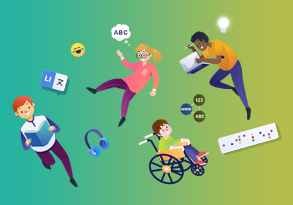
Use the visit to the Centre to develop the skills of listening, speaking, reading and writing by giving the activities a purpose.
During a visit to the Centre, learners can:
- design a poster to encourage visitors to the Centre
- present an argument (orally or written) about the place of zoos in society
- write a story about one of our birds
- listen to stories about owls or eagles
- write a report about one of the species at the Centre
Examples of progression steps:
I can listen to, understand and communicate the general meaning of what I hear.
I can listen to and understand information about a variety of topics, summarising the main points.
I can use my imagination to respond to and adapt literature to create my own work.
I can communicate meaning using extended speech and/or gesture.
I can recognise the appropriate language for different audiences and purposes, varying my expression, vocabulary and tone to engage the audience.
Expressive Arts

Using the media of art, dance, drama, film and digital media and music, can learners respond to their visit?
During a visit to the Centre, learners can:
- create a work of art of a chosen bird
- design a detailed artwork of a single feather
- collaborate on a digital campaign/film/drama to protect those species in danger
- compose music to reflect the majesty of flight
- find examples of expressive arts that have been inspired by birds and use them to develop their own expressive skills
Examples of progression steps:
I can communicate my ideas, feelings and memories in my creative work.
I can perform, produce, design, exhibit and share my creative work in a variety of ways for different audiences, inspired by a range of stimuli and experiences.
I can perform, produce, design, exhibit and share my creative work in formal and non-formal contexts, considering the impact of my creative work on the audience.
I can use my experimentation and investigation to manipulate creative work with purpose and intent when communicating my ideas.
Mathematics and Numeracy

A trip to the Centre can develop learners’ ability to solve problems in real-world contexts as they have experiences that are as engaging, exciting and accessible as possible for learners,
During a visit to the Centre, learners can:
- develop their understanding of the number system in a real life context, e.g. comparing the maximum speed of each species or the different weights of the birds
- improve their ability to order the birds according to maximum speed
- apply their measuring skills, e.g. the lengths of some feathers
- explore the language of shape, e.g. compare the birds’ features, e.g. wings, tails, eyes etc
- practise money skills through role play, e.g. have a gift shop in the classroom where learners can buy souvenirs
Examples of progression steps:
I have explored, compared, and used the general language of shapes through investigative play.
I have experienced and explored numbers, including cardinal, ordinal and nominal numbers, in number-rich indoor and outdoor environments.
I can estimate and measure, using non-standard units, before progressing onto standard units.
I have explored two-dimensional and three-dimensional shapes and their properties in a range of contexts.
I can understand the equivalence and value of coins and notes to make appropriate transactions in role play.
Predators
In addition to learning about the different ways that our birds hunt for their preferred prey, you will find out about the skills and features that they have which make them apex predators. A visit to the Centre can also provide the inspiration for a wide range of learning opportunities across the curriculum.
Science and Technology

A visit to the Centre can teach pupils about the ecosystems around them and enable them to identify and engage with scientific and technological change. It also encourages them to take risks, to innovate and evaluate, and learn to develop solutions.
During a visit to the Centre, learners can:
- learn about the features that each bird of prey has to make it a great hunter
- find out if all birds of preys hunt
- watch how a variety of birds of prey use their different styles of flight to gain an advantage over their preferred prey
- learn about the interdependence of various species within the ecosystem
- develop an understanding of what food chains and food webs are in a real-life context
- work out what styles of flight work best for which species and why.
- study wing shapes and styles and the advantages and disadvantages of each
- learn how the natural world has influenced the development of different technologies
- find out how external factors have affected different species e.g. the use of pesticides and its effect on the food chain
Examples of Progression steps:
I can recognise that what I do, and the things I use, can have an impact on my environment and on living things.
I can explore relationships between living things, their habitats and their life cycles.
I can explain how variation of organisms within a changing environment leads to natural selection which drives evolution.
I can describe how living things compete for specific resources and depend on each other for survival.
I can describe the interdependence of organisms in ecosystems and explain how this affects their chances of survival.
Humanities

Experiencing the wonder of the natural world can contribute to learners’ spiritual development and well-being, and can help to cultivate in them a sense of place and sense of belonging, as embodied in the Welsh word cynefin.
During a visit to the Centre, learners can:
- consider the impact of environmental change such as industrialisation and the effect on habitats and wildlife
- learn about the impact of humans on the planet and find ways to help in the future as responsible citizens of Wales
- discuss the role of zoos or centres such as this in conservation
- encourage learners to critically reflect on their own and others’ beliefs, values and attitudes in order that they can develop as self-aware, informed, ethical global citizens
Examples of Progression steps:
I can describe and give simple explanations about the impact of human actions on the natural world in the past and present.
I can give simple descriptions of the processes that lead to change in the natural world.
I can explain and analyse the causes of a range of events and changes in the past and present and can appreciate how causes can often be interconnected and differ in importance.
Health and Well-being

A visit to the centre can help learners to understand how decisions and actions impact on themselves, on others and on wider society, both now and in the future. It can also be a starting point for discussions about the benefits of outdoor activities and emotional well-being.
During a visit to the Centre, learners can:
- begin to think of their role, both as individuals and as part of society in protecting the flora and fauna around us
- debate the effect that their peers may have on their behaviours – e.g. would they be influenced to drop litter or damage habitats in certain circumstances? How could they manage the influences of others
- consider their feelings about the birds, developing the language of emotions (joy, anxiety, awe etc)
Examples of Progression steps:
I can recognise that my decisions can impact on me and others, both now and in the future.
I can understand how and why my thoughts, feelings and actions change in response to different experiences.
I can make considered decisions, taking into account available information, including past experiences.
I have developed an understanding that my values, attitudes and identity are shaped by different groups and influences.
Languages, Literacy and Communication

Use the visit to the Centre to develop the skills of listening, speaking, reading and writing by giving the activities a purpose.
During a visit to the Centre, learners can:
- compare and contrast the different styles of hunting and the features that make the bird so successful
- design a poster to encourage visitors to the Centre
- present an argument (orally or written) about the place of zoos in society
- write a story about one of our birds
- listen to stories about owls or eagles
- write a report about one of the species at the Centre
Examples of Progression steps:
I can listen to, understand and communicate the general meaning of what I hear.
I can listen to and understand information about a variety of topics, summarising the main points.
I can use my imagination to respond to and adapt literature to create my own work.
I can communicate meaning using extended speech and/or gesture.
I can recognise the appropriate language for different audiences and purposes, varying my expression, vocabulary and tone to engage the audience.
Expressive Arts

Using the media of art, dance, drama, film and digital media and music, can learners respond to their visit?
During a visit to the Centre, learners can:
- create a work of art of a chosen bird
- draw a detailed picture of a single feather
- collaborate to develop a digital campaign/film/drama to protect those species in danger
- compose music to reflect the majesty of flight
- find examples of expressive arts that have been inspired by birds and use them to develop their own expressive skills
Examples of Progression steps:
I can communicate my ideas, feelings and memories in my creative work.
I can perform, produce, design, exhibit and share my creative work in a variety of ways for different audiences, inspired by a range of stimuli and experiences.
I can perform, produce, design, exhibit and share my creative work in formal and non-formal contexts, considering the impact of my creative work on the audience.
I can use my experimentation and investigation to manipulate creative work with purpose and intent when communicating my ideas.
Mathematics and Numeracy

A trip to the Centre can develop learners’ ability to solve problems in real-world contexts as they have experiences that are as engaging, exciting and accessible as possible for learners.
During a visit to the Centre, learners can:
- analyse how changes in numbers of some species impacts on the numbers of species linked to it in the food chain
- solve problems related to food chains, e.g. Some animals like sharks are 5th order consumers! Sharks eat tuna that eat mackerel that eat herring that eat copepods that eat diatoms. If we were to make the reasonable assumption that each of these animals eats 2 of its prey each day, how many organisms died to feed the shark in one day?
- develop an understanding of the number system in a real life context, e.g. comparing the maximum speed of each species or the different weights of the birds
- sort and order the birds according to maximum speed
- practise their measuring skills, e.g. the lengths of some feathers
- develop the ability to use the language of shape, e.g. compare the birds’ features, e.g. wings, tails, eyes etc
Examples of Progression steps:
I have explored, compared, and used the general language of shapes through investigative play.
I have experienced and explored numbers, including cardinal, ordinal and nominal numbers, in number-rich indoor and outdoor environments.
I can estimate and measure, using non-standard units, before progressing onto standard units.
I have explored two-dimensional and three-dimensional shapes and their properties in a range of contexts.
I can understand the equivalence and value of coins and notes to make appropriate transactions in role play.
Owl Pellet Investigation
In addition to having the opportunity to dissect an owl pellet and use the chart to work out what the owl has eaten, a visit to the Centre can also be the inspiration for activities in other curriculum areas.
Science and Technology

A visit to the Centre can teach pupils about the ecosystems around them and enable them to identify and engage with scientific and technological change. It also encourages them to take risks, to innovate and evaluate, and learn to develop solutions.
During a visit to the Centre, learners can:
- dissect an owl pellet and use the chart to work out which creatures the owl has eaten
- watch how a variety of birds of prey use their different styles of flight to hunt for their preferred prey
- work out what styles of flight work best for which species and why.
- study wing shapes and styles and the advantages and disadvantages of each
- learn how the natural world has influenced the development of different technologies
- find out how external factors have affected different species e.g. the use of pesticides and its effect on the food chain
- learn about the interdependence of various species within the ecosystem
Examples of Progression steps:
I can recognise that what I do, and the things I use, can have an impact on my environment and on living things.
I can explore relationships between living things, their habitats and their life cycles.
I can draw inspiration to design from historical, cultural and other sources.
I can describe how living things compete for specific resources and depend on each other for survival.
I can describe the interdependence of organisms in ecosystems and explain how this affects their chances of survival.
Humanities

Experiencing the wonder of the natural world can contribute to learners’ spiritual development and well-being, and can help to cultivate in them a sense of place and sense of belonging, as embodied in the Welsh word cynefin.
During a visit to the Centre, learners can:
- consider the impact of environmental change such as industrialisation and the effect on habitats and wildlife
- discuss the role of zoos or centres such as this in conservation
- learn about the impact of humans on the planet and find ways to help in the future as responsible citizens of Wales
- encourage learners to critically reflect on their own and others’ beliefs, values and attitudes in order that they can develop as self-aware, informed, ethical global citizens
Examples of Progression steps:
I am beginning to appreciate and care for living things and my own environment.
I can understand the consequences of my actions and the actions of others, and how these affect local, national and global issues.
I can present what I have discovered in a variety of ways and draw simple conclusions.
I can describe and give simple explanations about the impact of human actions on the natural world in the past and present.
I can give simple descriptions of the processes that lead to change in the natural world.
I can explain and analyse the causes of a range of events and changes in the past and present and can appreciate how causes can often be interconnected and differ in importance.
Health and Well-being

A visit to the centre can help learners to understand how decisions and actions impact on themselves, on others and on wider society, both now and in the future. It can also be a starting point for discussions about the benefits of outdoor activities and emotional well-being.
During a visit to the Centre, learners can:
- consider their feelings about the birds, developing the language of emotions (joy, anxiety, awe etc)
- begin to think of their role, both as individuals and as part of society in protecting the fauna around us
- debate the effect that their peers may have on their behaviours – e.g. would they be influenced to drop litter or damage habitats in certain circumstances? How could they manage the influences of others?
Examples of Progression steps:
I can recognise that my decisions can impact on me and others, both now and in the future.
I can understand how and why my thoughts, feelings and actions change in response to different experiences.
I can make considered decisions, taking into account available information, including past experiences.
I have developed an understanding that my values, attitudes and identity are shaped by different groups and influences.
Languages, Literacy and Communication

Use the visit to the Centre to develop the skills of listening, speaking, reading and writing by giving the activities a purpose.
During a visit to the Centre, learners can:
- design a poster to encourage visitors to the Centre
- present an argument (orally or written) about the place of zoos in society
- write a story about one of our birds
- write a report about one of the species at the Centre
Examples of Progression steps:
I can listen to, understand and communicate the general meaning of what I hear.
I can listen to and understand information about a variety of topics, summarising the main points.
I can use my imagination to respond to and adapt literature to create my own work.
I can communicate meaning using extended speech and/or gesture.
I can recognise the appropriate language for different audiences and purposes, varying my expression, vocabulary and tone to engage the audience.
Expressive Arts

Using the media of art, dance, drama, film and digital media and music, can learners respond to their visit?
During a visit to the Centre, learners can:
- create a work of art of a chosen bird
- draw a detailed representation of a single feather
- design a digital campaign/film/drama to protect those species in danger
- compose music to reflect the majesty of flight
- find examples of expressive arts that have been inspired by birds and use them to develop their own expressive skills
Examples of Progression steps:
I can communicate my ideas, feelings and memories in my creative work.
I can perform, produce, design, exhibit and share my creative work in a variety of ways for different audiences, inspired by a range of stimuli and experiences.
I can perform, produce, design, exhibit and share my creative work in formal and non-formal contexts, considering the impact of my creative work on the audience.
I can use my experimentation and investigation to manipulate creative work with purpose and intent when communicating my ideas.
Mathematics and Numeracy

A trip to the Centre can develop learners’ ability to solve problems in real-world contexts as they have experiences that are as engaging, exciting and accessible as possible for learners.
During a visit to the Centre, learners can:
- understand the number system in a real life context, e.g. comparing the maximum speed of each species or the different weights of the birds
- order the birds according to maximum speed
- practise measuring skills, e.g. the lengths of some feathers
- develop the ability to use the language of shape, e.g. compare the birds’ features, e.g. wings, tails, eyes etc
- money skills through role play, e.g. have a gift shop in the classroom where learners can buy souvenirs
Examples of Progression steps:
I have explored, compared, and used the general language of shapes through investigative play.
I have experienced and explored numbers, including cardinal, ordinal and nominal numbers, in number-rich indoor and outdoor environments.
I can estimate and measure, using non-standard units, before progressing onto standard units.
I have explored two-dimensional and three-dimensional shapes and their properties in a range of contexts.
I can understand the equivalence and value of coins and notes to make appropriate transactions in role play.
Conservation
In addition to having the opportunity to learn about a range of conservation projects, past, present and future that are happening across Wales and the UK, a visit to the Centre can also provide learning opportunities across the curriculum.
Science and Technology

A visit to the Centre can teach pupils about the ecosystems around them and enable them to identify and engage with scientific and technological change. It also encourages them to take risks, to innovate and evaluate, and learn to develop solutions.
During a visit to the Centre, learners can:
- find out how external factors have affected different species e.g. the use of pesticides and its effect on the food chain
- learn about the interdependence of various species within the ecosystem
- learn how the natural world has influenced the development of different technologies
- learn about successful conservation and re-introduction programmes and what is planned for the future
- find out how to play your part in protecting wildlife and their habitats
Examples of Progression Steps:
I can recognise that what I do, and the things I use, can have an impact on my environment and on living things.
I can explore relationships between living things, their habitats and their life cycles.
I can explain how variation of organisms within a changing environment leads to natural selection which drives evolution.
I can describe how living things compete for specific resources and depend on each other for survival.
I can describe the interdependence of organisms in ecosystems and explain how this affects their chances of survival.
Humanities

Experiencing the wonder of the natural world can contribute to learners’ spiritual development and well-being, and can help to cultivate in them a sense of place and sense of belonging, as embodied in the Welsh word cynefin.
During a visit to the Centre, learners can:
- consider the impact of environmental change such as industrialisation and the effect on habitats and wildlife
- discuss the role of zoos or centres such as this in conservation
- learn about the impact of humans on the planet and find ways to help in the future as responsible citizens of Wales
- encourage learners to critically reflect on their own and others’ beliefs, values and attitudes in order that they can develop as self-aware, informed, ethical global citizens
Examples of Progression Steps:
I am beginning to appreciate and care for living things and my own environment.
I can understand the consequences of my actions and the actions of others, and how these affect local, national and global issues.
I can present what I have discovered in a variety of ways and draw simple conclusions.
I can describe and give simple explanations about the impact of human actions on the natural world in the past and present.
I can give simple descriptions of the processes that lead to change in the natural world.
I can explain and analyse the causes of a range of events and changes in the past and present and can appreciate how causes can often be interconnected and differ in importance.
Health and Well-being

A visit to the centre can help learners to understand how decisions and actions impact on themselves, on others and on wider society, both now and in the future. It can also be a starting point for discussions about the benefits of outdoor activities and emotional well-being.
During a visit to the Centre, learners can:
- find out about industrialisation and the effect on habitats and wildlife
- discuss the role of zoos or centres such as this in conservation
- learn about the impact of humans on the planet and find ways to help in the future as responsible citizens of Wales
- encourage learners to critically reflect on their own and others’ beliefs, values and attitudes in order that they can develop as self-aware, informed, ethical global citizens
Examples of Progression Steps:
I am beginning to appreciate and care for living things and my own environment.
I can understand the consequences of my actions and the actions of others, and how these affect local, national and global issues.
I can present what I have discovered in a variety of ways and draw simple conclusions.
I can describe and give simple explanations about the impact of human actions on the natural world in the past and present.
I can give simple descriptions of the processes that lead to change in the natural world.
I can explain and analyse the causes of a range of events and changes in the past and present and can appreciate how causes can often be interconnected and differ in importance.
Languages, Literacy and Communication

Use the visit to the Centre to develop the skills of listening, speaking, reading and writing by giving the activities a purpose.
During a visit to the Centre, learners can:
- Use the visit to the Centre to develop the skills of listening, speaking, reading and writing by giving the activities a purpose
- design a poster to promote Conservation projects – giving appropriate information and challenging mis-information
- present an argument (orally or written) about the place of zoos in society
- write a story about one of our birds, reflecting on the challenges that they may face in order to survive
- listen to stories about owls or eagle
- write a report about one of the species at the Centre
- hold a debate about the pros and cons of conservation projects
- write a persuasive letter to encourage support for the White-tailed eagle re-introduction project in Wales
Examples of Progression Steps:
I can listen to, understand and communicate the general meaning of what I hear.
I can listen to and understand information about a variety of topics, summarising the main points.
I can select and adapt the appropriate language for a range of audiences and purposes, conveying meaning effectively to the audience.
I can use my imagination to respond to and adapt literature to create my own work.
I can communicate meaning using extended speech and/or gesture.
I can recognise the appropriate language for different audiences and purposes, varying my expression, vocabulary and tone to engage the audience.
Expressive Arts

Using the media of art, dance, drama, film and digital media and music, can learners respond to their visit?
During a visit to the Centre, learners can:
- develop a digital campaign/film/drama to educate about the conservation projects either past, present or future
- create a work of art of a chosen bird
- present a detailed artwork of a single feather
- compose music to reflect the majesty of flight
- find examples of expressive arts that have been inspired by birds and use them to develop their own expressive skills
Examples of Progression Steps:
I can communicate my ideas, feelings and memories in my creative work.
I can perform, produce, design, exhibit and share my creative work in a variety of ways for different audiences, inspired by a range of stimuli and experiences.
I can perform, produce, design, exhibit and share my creative work in formal and non-formal contexts, considering the impact of my creative work on the audience.
I can use my experimentation and investigation to manipulate creative work with purpose and intent when communicating my ideas.
Mathematics and Numeracy

A trip to the Centre can develop learners’ ability to solve problems in real-world contexts as they have experiences that are as engaging, exciting and accessible as possible for learners.
During a visit to the Centre, learners can:
- develop the ability to identify trends in numbers by mapping the success (or failure) of conservation programmes – suggest reasons for why it’s going well or not
- calculate the distances travelled by birds that have GPS tagging – suggest reasons for the amount of travel
- understand the number system in a real-life context, e.g. comparing the maximum speed of each species or the different weights of the birds
- order the birds according to maximum speed
- improve measuring skills, e.g. comparing the lengths of some feathers
- develop the ability to use the language of shape, e.g. compare the birds’ features, e.g. wings, tails, eyes etc
Examples of Progression Steps:
I have explored, compared, and used the general language of shapes through investigative play.
I have experienced and explored numbers, including cardinal, ordinal and nominal numbers, in number-rich indoor and outdoor environments.
I can estimate and measure, using non-standard units, before progressing onto standard units.
I have explored two-dimensional and three-dimensional shapes and their properties in a range of contexts.
I can understand the equivalence and value of coins and notes to make appropriate transactions in role play.
Nocturnal Animals
You will learn about owls and the super powers (including eye colour, hearing and silent flight) that allow them to be brilliant at hunting at night. Whilst the main focus of the teaching activity will link most closely to Science and Technology, a visit to the Centre can also provide the inspiration for activities across the whole curriculum.
Science and Technology

A visit to the Centre can teach pupils about the ecosystems around them and enable them to identify and engage with scientific and technological change. It also encourages them to take risks, to innovate and evaluate, and learn to develop solutions.
During a visit to the Centre, learners can:
- learn what the words nocturnal, diurnal and crepuscular mean
- discover how to identify which birds are nocturnal
- find out about the features that enable the birds to see/hunt in the dark
- learn how the natural world has influenced the development of different technologies
- find out how external factors have affected different species e.g. the use of pesticides and its effect on the food chain
- learn about the interdependence of various species within the ecosystem
Examples of Progression Steps:
I can recognise that what I do, and the things I use, can have an impact on my environment and on living things.
I can explore relationships between living things, their habitats and their life cycles.
I can draw inspiration to design from historical, cultural and other sources.
I can describe how living things compete for specific resources and depend on each other for survival.
I can describe the interdependence of organisms in ecosystems and explain how this affects their chances of survival.
Humanities

Experiencing the wonder of the natural world can contribute to learners’ spiritual development and well-being, and can help to cultivate in them a sense of place and sense of belonging, as embodied in the Welsh word cynefin.
During a visit to the Centre, learners can:
- consider their feelings about the birds, developing the language of emotions (joy, anxiety, awe etc)
- begin to think of their role, both as individuals and as part of society in protecting the fauna around us
- debate the effect that different groups may have on their behaviours – e.g. would they be influenced to drop litter or damage habitats in certain circumstances? How could they manage the influences of others?
Examples of Progression Steps:
I am beginning to appreciate and care for living things and my own environment.
I can understand the consequences of my actions and the actions of others, and how these affect local, national and global issues.
I can present what I have discovered in a variety of ways and draw simple conclusions.
I can describe and give simple explanations about the impact of human actions on the natural world in the past and present.
I can give simple descriptions of the processes that lead to change in the natural world.
Health and Well-being

A visit to the centre can help learners to understand how decisions and actions impact on themselves, on others and on wider society, both now and in the future. It can also be a starting point for discussions about the benefits of outdoor activities and emotional well-being.
During a visit to the Centre, learners can:
- consider their feelings about the birds, developing the language of emotions (joy, anxiety, awe etc)
- begin to think of their role, both as individuals and as part of society in protecting the fauna around us
- debate the effect that different groups may have on their behaviours – e.g. would they be influenced to drop litter or damage habitats in certain circumstances? How could they manage the influences of others?
Examples of Progression Steps:
I can recognise that my decisions can impact on me and others, both now and in the future.
I can understand how and why my thoughts, feelings and actions change in response to different experiences.
I can make considered decisions, taking into account available information, including past experiences.
I have developed an understanding that my values, attitudes and identity are shaped by different groups and influences.
Languages, Literacy and Communication

Use the visit to the Centre to develop the skills of listening, speaking, reading and writing by giving the activities a purpose.
During a visit to the Centre, learners can:
- design a poster to encourage visitors to the Centre
- present an argument (orally or written) about the place of zoos in society
- write a story about one of our birds
- listen to stories about owls or eagles
- write a report about one of the species at the Centre
Examples of Progression Steps:
I can listen to, understand and communicate the general meaning of what I hear.
I can listen to and understand information about a variety of topics, summarising the main points.
I can use my imagination to respond to and adapt literature to create my own work.
I can communicate meaning using extended speech and/or gesture.
I can recognise the appropriate language for different audiences and purposes, varying my expression, vocabulary and tone to engage the audience.
Expressive Arts

Using the media of art, dance, drama, film and digital media and music, can learners respond to their visit?
During a visit to the Centre, learners can:
- create a work of art of a chosen bird
- produce a detailed artwork of a single feather
- design a digital campaign/film/drama to protect those species in danger
- compose music to reflect the majesty of flight
- find examples of expressive arts that have been inspired by birds and use them to develop their own expressive skills
Examples of Progression Steps:
I can communicate my ideas, feelings and memories in my creative work.
I can perform, produce, design, exhibit and share my creative work in a variety of ways for different audiences, inspired by a range of stimuli and experiences.
I can perform, produce, design, exhibit and share my creative work in formal and non-formal contexts, considering the impact of my creative work on the audience.
I can use my experimentation and investigation to manipulate creative work with purpose and intent when communicating my ideas.
Mathematics and Numeracy

A trip to the Centre can develop learners’ ability to solve problems in real-world contexts as they have experiences that are as engaging, exciting and accessible as possible for learners.
During a visit to the Centre, learners can:
- understanding of the number system in a real life context, e.g. comparing the maximum speed of each species or the different weights of the birds
- ability to order the birds according to maximum speed
- measuring skills, e.g. the lengths of some feathers
- ability to use the language of shape, e.g. compare the birds’ features, e.g. wings, tails, eyes etc
- money skills through role play, e.g. have a gift shop in the classroom where learners can buy souvenirs
Examples of Progression Steps:
I have explored, compared, and used the general language of shapes through investigative play.
I have experienced and explored numbers, including cardinal, ordinal and nominal numbers, in number-rich indoor and outdoor environments.
I can estimate and measure, using non-standard units, before progressing onto standard units.
I have explored two-dimensional and three-dimensional shapes and their properties in a range of contexts.
I can understand the equivalence and value of coins and notes to make appropriate transactions in role play.
Owl Babies
A visit to the Centre can be linked to the much-loved book by Martin Waddell where you can listen to the story in the presence of some of our owls - depending on the time of year you might even meet an owl baby! Whilst the main focus of this topic may initially be linked most closely to Languages, Literacy and Communication, a visit to the Centre can inspire activities and learning experiences across all six areas of the curriculum:
Science and Technology

A visit to the Centre can teach pupils about the ecosystems around them and enable them to identify and engage with scientific and technological change. It also encourages them to take risks, to innovate and evaluate, and learn to develop solutions.
During a visit to the Centre, learners can:
- learn about why some owls are awake at night or day
- think about why the owlets are different sizes
- work out what styles of flight work best for which species and why
- find out about owl eyes – explore the Centre to find out which are nocturnal, diurnal or crepuscular
- learn about the features of an owl and how they help them to hunt
- barn owls have exceptional hearing – go on a sound hunt to see what you can hear
- dissect an owl pellet to find out what it has eaten
Examples of Progression Steps:
I can recognise that what I do, and the things I use, can have an impact on my environment and on living things.
I can explore relationships between living things, their habitats and their life cycles.
I can draw inspiration to design from historical, cultural and other sources.
I can describe how living things compete for specific resources and depend on each other for survival.
I can describe the interdependence of organisms in ecosystems and explain how this affects their chances of survival.
Humanities

Experiencing the wonder of the natural world can contribute to learners’ spiritual development and well-being, and can help to cultivate in them a sense of place and sense of belonging, as embodied in the Welsh word cynefin.
During a visit to the Centre, learners can:
- Look at a map of Wales – where would you find the different types of owls?
- discuss what is being done to protect owls in the UK
- learn about how they can help to protect owls in their own school or garden (e.g. a wild garden area)
Examples of Progression Steps:
I am beginning to appreciate and care for living things and my own environment.
I can understand the consequences of my actions and the actions of others, and how these affect local, national and global issues.
I can present what I have discovered in a variety of ways and draw simple conclusions.
I can describe and give simple explanations about the impact of human actions on the natural world in the past and present.
I can give simple descriptions of the processes that lead to change in the natural world.
Health and Well-being

A visit to the centre can help learners to understand how decisions and actions impact on themselves, on others and on wider society, both now and in the future. It can also be a starting point for discussions about the benefits of outdoor activities and emotional well-being.
During a visit to the Centre, learners can:
- consider their feelings about the birds, developing the language of emotions (joy, anxiety, awe etc)
- begin to think of their role, both as individuals and as part of society in protecting the flora and fauna around us
Examples of Progression Steps:
I can recognise that my decisions can impact on me and others, both now and in the future.
I can understand how and why my thoughts, feelings and actions change in response to different experiences.
I can make considered decisions, taking into account available information, including past experiences.
I have developed an understanding that my values, attitudes and identity are shaped by different groups and influences.
Languages, Literacy and Communication

Use the visit to the Centre to develop the skills of listening, speaking, reading and writing by giving the activities a purpose.
During a visit to the Centre, learners can:
- listen to the story in the presence of an owl
- design a poster to encourage visitors to the Centre
- draw a story map of Owl Babies
- write a story about one of our birds and their babies
- listen to stories about owls or eagles
- write a report about one of the species at the Centre
Examples of Progression Steps:
I can listen to, understand and communicate the general meaning of what I hear.
I can retell stories creatively.
I am beginning to show empathy with characters in literature.
I can listen to and understand information about a variety of topics, summarising the main points.
I can use my imagination to respond to and adapt literature to create my own work.
Expressive Arts

Using the media of art, dance, drama, film and digital media and music, can learners respond to their visit?
During a visit to the Centre, learners can:
- act out the story
- creating a work of art of Troy, our tawny owl
- create a night-time picture
- create a picture of the owl babies on their branch
Examples of Progression Steps:
I can communicate my ideas, feelings and memories in my creative work.
I can perform, produce, design, exhibit and share my creative work in a variety of ways for different audiences, inspired by a range of stimuli and experiences.
I can perform, produce, design, exhibit and share my creative work in formal and non-formal contexts, considering the impact of my creative work on the audience.
I can use my experimentation and investigation to manipulate creative work with purpose and intent when communicating my ideas.
Mathematics and Numeracy

A trip to the Centre can develop learners’ ability to solve problems in real-world contexts as they have experiences that are as engaging, exciting and accessible as possible for learners.
During a visit to the Centre, learners can:
- learn to count in 3s
- compare the size of objects – like the owlets
- understanding of the number system in a real life context, e.g. comparing the maximum speed of each species or the different weights of the birds
- ability to order the birds according to maximum speed
- measuring skills, e.g. the lengths of some feathers
- ability to use the language of shape, e.g. compare the birds’ features, e.g. wings, tails, eyes etc
- money skills through role play, e.g. have a gift shop in the classroom where learners can buy souvenirs
Examples of Progression Steps:
I have explored, compared, and used the general language of shapes through investigative play.
I have experienced and explored numbers, including cardinal, ordinal and nominal numbers, in number-rich indoor and outdoor environments.
I can estimate and measure, using non-standard units, before progressing onto standard units.
I have explored two-dimensional and three-dimensional shapes and their properties in a range of contexts.
I can understand the equivalence and value of coins and notes to make appropriate transactions in role play.
The Owl who was Afraid of the Dark
Your visit to the Centre can be linked to the much loved book by Jill Tomlinson, where we meet Plop and learn about his fear of the dark. You can listen to an extract of the story, meet our very own barn owl and find out all about their features. Whilst the main focus of this topic may initially be linked most closely to Languages, Literacy and Communication, a visit to the Centre can inspire activities and learning experiences across all six areas:
Science and Technology

A visit to the Centre can teach pupils about the ecosystems around them and enable them to identify and engage with scientific and technological change. It also encourages them to take risks, to innovate and evaluate, and learn to develop solutions.
During a visit to the Centre, learners can:
- find out about owl eyes – explore the Centre to find out which are nocturnal, diurnal or crepuscular
- learn about the features of an owl and how they help them to hunt
- barn owls have exceptional hearing – go on a sound hunt to see what you can hear
- dissect an owl pellet to find out what it has eaten
- watch how a variety of birds of prey use their different styles of flight (e.g. silent flight of the barn owl) to gain an advantage over their prey
Examples of Progression Steps:
I can recognise that what I do, and the things I use, can have an impact on my environment and on living things.
I can explore relationships between living things, their habitats and their life cycles.
I can draw inspiration to design from historical, cultural and other sources.
I can describe how living things compete for specific resources and depend on each other for survival.
I can describe the interdependence of organisms in ecosystems and explain how this affects their chances of survival.
Humanities

Experiencing the wonder of the natural world can contribute to learners’ spiritual development and well-being, and can help to cultivate in them a sense of place and sense of belonging, as embodied in the Welsh word cynefin.
During a visit to the Centre, learners can:
- Look at a map of Wales – where would you find the different types of owls?
- discuss what is being done to protect owls in the UK
- learn about how they can help to protect owls in their own school or garden (e.g. a wild garden area)
Examples of Progression Steps:
I am beginning to appreciate and care for living things and my own environment.
I can understand the consequences of my actions and the actions of others, and how these affect local, national and global issues.
I can present what I have discovered in a variety of ways and draw simple conclusions.
I can describe and give simple explanations about the impact of human actions on the natural world in the past and present.
I can give simple descriptions of the processes that lead to change in the natural world.
Health and Well-being

A visit to the centre can help learners to understand how decisions and actions impact on themselves, on others and on wider society, both now and in the future. It can also be a starting point for discussions about the benefits of outdoor activities and emotional well-being.
During a visit to the Centre, learners can:
- think about what you are afraid of – what can you do to make it easier to manage that fear?
- consider their feelings about the birds, developing the language of emotions (joy, anxiety, awe etc)
- begin to think of their role, both as individuals and as part of society in protecting the flora and fauna around us
Examples of Progression Steps:
I can recognise that my decisions can impact on me and others, both now and in the future.
I can understand how and why my thoughts, feelings and actions change in response to different experiences.
I can make considered decisions, taking into account available information, including past experiences.
I have developed an understanding that my values, attitudes and identity are shaped by different groups and influences.
Languages, Literacy and Coomunication

Use the visit to the Centre to develop the skills of listening, speaking, reading and writing by giving the activities a purpose.
During a visit to the Centre, learners can:
- listen to an excerpt from the book in the presence of an owl
- write a story about one of our birds – what might they be afraid of?
- talk to your classmates about what is better… day or night?
- write a letter to Plop to tell him what you like about the night-time
- develop understanding of language by exploring the use of adjectives and alliteration in the book
Examples of Progression Steps:
I can listen to, understand and communicate the general meaning of what I hear.
I can retell stories creatively.
I am beginning to show empathy with characters in literature.
I can listen to and understand information about a variety of topics, summarising the main points.
I can use my imagination to respond to and adapt literature to create my own work.
I can communicate meaning using extended speech and/or gesture.
I can recognise the appropriate language for different audiences and purposes, varying my expression, vocabulary and tone to engage the audience.
Expressive Arts

Using the media of art, dance, drama, film and digital media and music, can learners respond to their visit?
During a visit to the Centre, learners can:
- act out the story
- create a firework painting
- creating a work of art of Plop
- create a night-time picture
- detailed artwork of a single feather
- find examples of expressive arts that have been inspired by birds and use them to develop their own expressive skills
Examples of Progression Steps:
I can communicate my ideas, feelings and memories in my creative work.
I can perform, produce, design, exhibit and share my creative work in a variety of ways for different audiences, inspired by a range of stimuli and experiences.
I can perform, produce, design, exhibit and share my creative work in formal and non-formal contexts, considering the impact of my creative work on the audience.
I can use my experimentation and investigation to manipulate creative work with purpose and intent when communicating my ideas.
Mathematics and Numeracy

A trip to the Centre can develop learners’ ability to solve problems in real-world contexts as they have experiences that are as engaging, exciting and accessible as possible for learners.
During a visit to the Centre, learners can:
- develop the ability to order the birds according to maximum speed
- practise their measuring skills, e.g. the lengths of some feathers
- use the language of shape, e.g. compare the birds’ features, e.g. wings, tails, eyes etc
- practise money skills through role play, e.g. have a gift shop in the classroom where learners can buy souvenirs
- understand the number system in a real life context, e.g. comparing the maximum speed of each species or the different weights of the birds
Examples of Progression Steps:
I have explored, compared, and used the general language of shapes through investigative play.
I have experienced and explored numbers, including cardinal, ordinal and nominal numbers, in number-rich indoor and outdoor environments.
I can estimate and measure, using non-standard units, before progressing onto standard units.
I have explored two-dimensional and three-dimensional shapes and their properties in a range of contexts.
I can understand the equivalence and value of coins and notes to make appropriate transactions in role play.
Tailored Sessions
We are always keen to work together with schools to further develop our Education programme. If you have other ideas about how a visit to the Centre can benefit your pupils please get in touch and we can plan a tailor-made session for you. Some possible collaborations are:
-
an art project
-
a photography session
-
inspiration for creative writing
-
learning about the world of work
-
enterprise challenges



